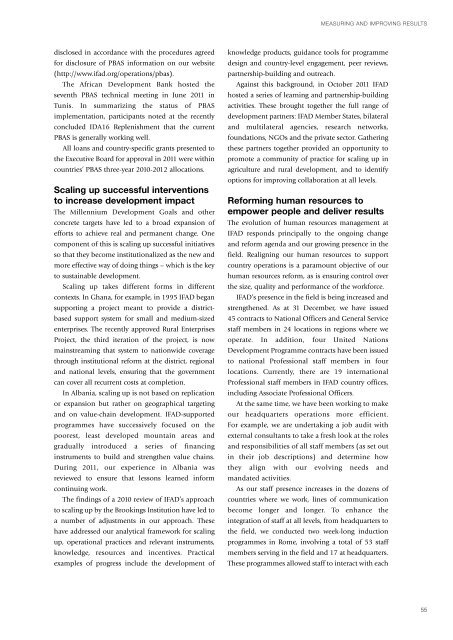ANNUAL REPORT 2011 - IFAD
ANNUAL REPORT 2011 - IFAD
ANNUAL REPORT 2011 - IFAD
You also want an ePaper? Increase the reach of your titles
YUMPU automatically turns print PDFs into web optimized ePapers that Google loves.
disclosed in accordance with the procedures agreed<br />
for disclosure of PBAS information on our website<br />
(http://www.ifad.org/operations/pbas).<br />
The African Development Bank hosted the<br />
seventh PBAS technical meeting in June <strong>2011</strong> in<br />
Tunis. In summarizing the status of PBAS<br />
implementation, participants noted at the recently<br />
concluded IDA16 Replenishment that the current<br />
PBAS is generally working well.<br />
All loans and country-specific grants presented to<br />
the Executive Board for approval in <strong>2011</strong> were within<br />
countries’ PBAS three-year 2010-2012 allocations.<br />
Scaling up successful interventions<br />
to increase development impact<br />
The Millennium Development Goals and other<br />
concrete targets have led to a broad expansion of<br />
efforts to achieve real and permanent change. One<br />
component of this is scaling up successful initiatives<br />
so that they become institutionalized as the new and<br />
more effective way of doing things – which is the key<br />
to sustainable development.<br />
Scaling up takes different forms in different<br />
contexts. In Ghana, for example, in 1995 <strong>IFAD</strong> began<br />
supporting a project meant to provide a districtbased<br />
support system for small and medium-sized<br />
enterprises. The recently approved Rural Enterprises<br />
Project, the third iteration of the project, is now<br />
mainstreaming that system to nationwide coverage<br />
through institutional reform at the district, regional<br />
and national levels, ensuring that the government<br />
can cover all recurrent costs at completion.<br />
In Albania, scaling up is not based on replication<br />
or expansion but rather on geographical targeting<br />
and on value-chain development. <strong>IFAD</strong>-supported<br />
programmes have successively focused on the<br />
poorest, least developed mountain areas and<br />
gradually introduced a series of financing<br />
instruments to build and strengthen value chains.<br />
During <strong>2011</strong>, our experience in Albania was<br />
reviewed to ensure that lessons learned inform<br />
continuing work.<br />
The findings of a 2010 review of <strong>IFAD</strong>’s approach<br />
to scaling up by the Brookings Institution have led to<br />
a number of adjustments in our approach. These<br />
have addressed our analytical framework for scaling<br />
up, operational practices and relevant instruments,<br />
knowledge, resources and incentives. Practical<br />
examples of progress include the development of<br />
MEASURING AND IMPROVING RESULTS<br />
knowledge products, guidance tools for programme<br />
design and country-level engagement, peer reviews,<br />
partnership-building and outreach.<br />
Against this background, in October <strong>2011</strong> <strong>IFAD</strong><br />
hosted a series of learning and partnership-building<br />
activities. These brought together the full range of<br />
development partners: <strong>IFAD</strong> Member States, bilateral<br />
and multilateral agencies, research networks,<br />
foundations, NGOs and the private sector. Gathering<br />
these partners together provided an opportunity to<br />
promote a community of practice for scaling up in<br />
agriculture and rural development, and to identify<br />
options for improving collaboration at all levels.<br />
Reforming human resources to<br />
empower people and deliver results<br />
The evolution of human resources management at<br />
<strong>IFAD</strong> responds principally to the ongoing change<br />
and reform agenda and our growing presence in the<br />
field. Realigning our human resources to support<br />
country operations is a paramount objective of our<br />
human resources reform, as is ensuring control over<br />
the size, quality and performance of the workforce.<br />
<strong>IFAD</strong>’s presence in the field is being increased and<br />
strengthened. As at 31 December, we have issued<br />
45 contracts to National Officers and General Service<br />
staff members in 24 locations in regions where we<br />
operate. In addition, four United Nations<br />
Development Programme contracts have been issued<br />
to national Professional staff members in four<br />
locations. Currently, there are 19 international<br />
Professional staff members in <strong>IFAD</strong> country offices,<br />
including Associate Professional Officers.<br />
At the same time, we have been working to make<br />
our headquarters operations more efficient.<br />
For example, we are undertaking a job audit with<br />
external consultants to take a fresh look at the roles<br />
and responsibilities of all staff members (as set out<br />
in their job descriptions) and determine how<br />
they align with our evolving needs and<br />
mandated activities.<br />
As our staff presence increases in the dozens of<br />
countries where we work, lines of communication<br />
become longer and longer. To enhance the<br />
integration of staff at all levels, from headquarters to<br />
the field, we conducted two week-long induction<br />
programmes in Rome, involving a total of 53 staff<br />
members serving in the field and 17 at headquarters.<br />
These programmes allowed staff to interact with each<br />
55

















